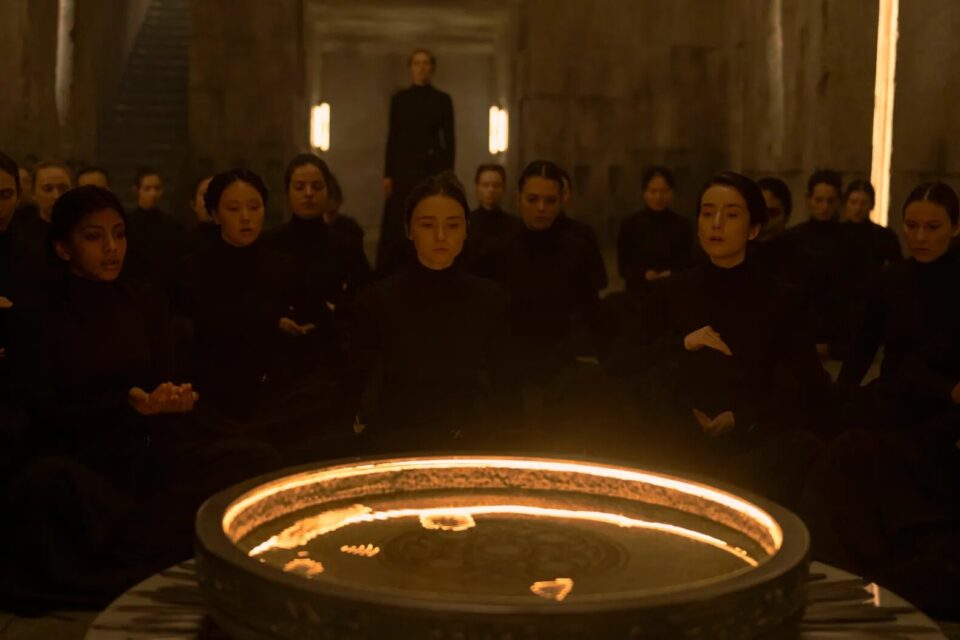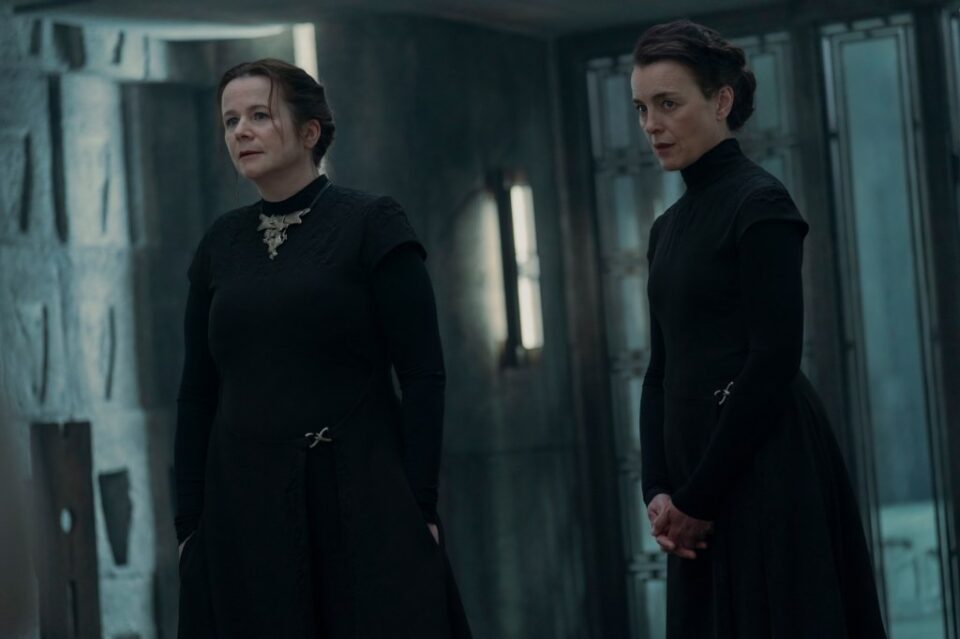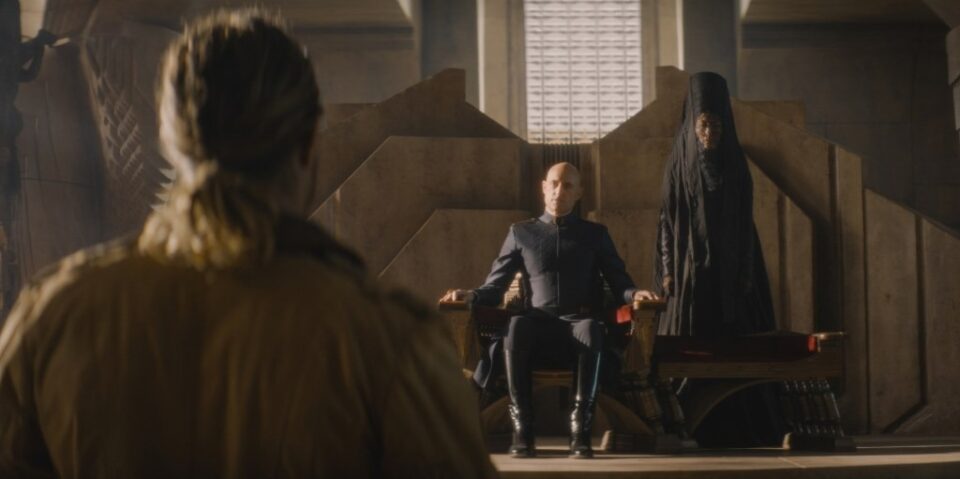‘Dune: Prophecy’ Would Simply Love to Be a Sci-Fi ‘Game of Thrones’
Whether this wonky, six-episode prequel to Denis Villeneuve’s cinematic universe — based on Frank Hebert’s novels — will make that prophecy come true is a whole other matter

Charithra Chandran, Yerin Ha, Jessica Barden, and Emma Canning in 'Dune: Prophecy.' Attila Szvacsek/HBO
He who controls the franchises, controls the world! Denis Villeneuve had not even completed the first half of his two-part Dune adaptation before plans for a TV spin-off were announced in 2019 — it was already obvious that his particular spice world would be fertile ground for future intellectual-property harvesting. Frank Herbert’s sci-fi epic had been brought to the small screen before, but this new HBO series would build off of Villeneuve’s vision and borrow from the 2012 novel Sisterhood of Dune, written by Brian “Son of Frank” Herbert and Kevin J. Anderson. It would be set several millennia before the birth of the movies’ hero Paul Atreides, or, per some of the talent involved, “10,000 B.C. (Before Chalamet).” The focus would be on the early days of the Bene Gesserit, that mystical order of females who controlled the machinations of empire behind the scenes. There’s the promise of interstellar intrigue, plenty of both backstabbing and literal stabbing, and lots of fashionably tall headwear. In terms of prequel fodder, you could do worse.
Viewers will indeed recognize the terrain when they watch Dune: Prophecy, which premieres November 17th, but not necessarily because of the source material or its blockbuster-movie predecessors. It does replicate the scale and sense of grandeur of Villeneuve’s Dune-iverse, as well as the Heavy Metal magazine-cover look and future-brutalist production design of the films; one character describes an imperial planet by saying, “If you like barren landscapes and minimalism, you’ll be very happy,” a wisecrack which doubles nicely as mission statement for the show itself. But what Prophecy is really aiming for is less a continuation of a cinematic saga and something closer to a copycat of a previous success. This does not want to be Dune TV. It wants to be a science fiction Game of Thrones.
And if the idea is to accomplish this aspirational goal by simply staging people scheming in palaces, exchanges with scrappy warriors, and the inevitable sex scenes on new sets, with the hope that sandworms are a decent enough substitution for dragons… well, we wish them the best of luck. Dune: Prophecy may be blessed with brand-name recognition, a great cast, an extraordinary proof of concept honed over two popular movies and a lot of fandom good will. There is still enough Dune in it to gently scratch an itch while waiting for a potential Part 3. But whatever inherited and/or distinct elements it has is eclipsed by an overwhelming sense of premium-cable déjà vu. It’s trying so hard to fill a GoT-but-in-space mandate that it often forgets to serve its I.P. narrative duties while bending over backwards to please its corporate masters. You think desert dwellers on Arakis are thirsty? They have nothing on this series.
At the very least, you will get a peek into one of the franchise’s more enigmatic and exotic sects. After a Terminator-like preamble that establishes the “Great Machine War” and humanity’s eventual victory over (and banning of) A.I. technology, we get to meet the future Gesserit-in-chief. As a young woman, Valya Harkonnen (Jessica Barden) finds a place among the initiates of what is then known as “the Sisterhood.” She’s ambitious, headstrong, and has a chip on her shoulder over the fact that her family has been disgraced via lies spread by — wait for it — House Atreides. Valya has also mastered the art of vocal manipulation that will one day be the Bene Gesserit’s stock in trade, but which now gets her exiled. Years later, she will return, and the older Valya (Emily Watson) will take her rightful place as the order’s Mother Superior. Her sister, Tula Harkonnen (Olivia Williams), also joins the group, and aids in training the sisters to be “truthsayers,” i.e. human lie-detectors for the rich and powerful.

Such witchy fact checkers come in handy for someone like Emperor Javicco Corrino (Mark Strong), supreme ruler of the galaxy. He and his wife, Empress Natalya (Jodhi May) — who exudes some serious Lady Macbeth vibes from the jump — were going to let their daughter, Princess Ynez (Sarah-Sofie Boussnina), join the Sisterhood. But Corrino needs to protect his interests on Arakis, since Fremen have been attacking his men. And that means that a marriage between his family and one of the royal houses, specifically one with a fleet of ships, is necessary. Ynez must now become the blushing bride to a prince as part of this power-brokering barter. Never mind that the groom is only nine years old — this just means she’ll have more time to herself while he plays with toys. Ok!
This union is cause for consternation among a lot of interested parties. Valya had hoped that Ynez joining the holy order would give the Sisterhood some leverage in the royal entourage. There’s also worry among the reverend mothers that the nuptials will somehow bring on a cataclysmic event known as “the Reckoning.” Meanwhile, Ynez’s swordmaster, Keiran Atreides (Chris Mason), is aware that their mutual attraction may be forbidden, especially now that she’s betrothed, but that doesn’t stop him from making goo-goo eyes at her. As for Ynez’s fuckboi brother, Prince Constantine (Josh Heuston), he’s bummed for his sister but is more concerned with indulging in off-world nightlife. Frank Herbert had long made the connection between spice and hallucinogens. Apparently, there’s a good deal of cocaine and other club drugs floating around the Dune-iverse as well.

Then a mysterious stranger shows up at the palace. His name is Desmond Hart (Vikings‘ Travis Fimmel), and he resembles Jason Momoa’s Duncan Idaho after a month-long bender. A former soldier stationed on Arakis, he claims to have had a one-on-one encounter with a sandworm. The experience left him… changed. Several unexplained deaths later, Hart is offering to personally counsel the emperor and has helped make Valya persona non grata at court. Mother Superior smells a rat. Now she just has to mount a stealth counterattack and solve these crimes before this vague prophecy of Armageddon destroys the universe, etc., etc.
There’s more, of course, including a brewing rebellion, some inter-convent bonding, a subplot involving a Water-of-Life ritual gone wrong, some leftover “intelligent machines” and your run-of-the-mill sci-fi/fantasy skullduggery. Last-showrunner-standing Alison Shapker is a veteran of Alias, Fringe and Westworld, and you can see where she’s drawn from each of these in terms of the multiple storylines. Other than the signature palette of art-deco-meets-ancient-Egypt production design, however, this could be any genre franchise you’ve seen over the past 40 years. There’s even a flashback scene set in a forest that might have been lifted from Lord of the Rings, or The Wheel of Time, or, yes, George R.R. Martin’s songs of fire and ice; you half wonder if White Walkers or Ewoks might suddenly make an appearance. The one major difference is that rather than putting the fate of the galaxy on one young messiah’s slim shoulders, Dune: Prophecy divvies up the responsibility to a group of powerful women in control of their own fates. Given the timing of the show’s airing, that alone will make this a much-needed tonic for many in need of escapism.
But that factor, along with Watson’s juicy, committed take on a Mother Superior scorned — the actor gives such great glare! — isn’t quite enough to shake the feeling you’ve been here before, and in better hands. Herbert’s book became a key foundational text for too many otherworldly epics to count. When Alejandro Jodorowsky attempted to turn it into a movie in the mid-1970s, his surreal, outré concepts for depicting Dune‘s cosmic architecture and complicated heroes and villains still bled into everything from Star Wars to Alien. Not too be too auteurist about everything, but so much of what’s made Villeneuve’e re-imagining feel revolutionary is not just his passion for the material but how he’s brought his Roger-Dean-high-on-spice vision to the big screen.
Wisely, Dune: Prophecy makes that vision it’s jumping-off point — it knows a good cinematic universe when it sees one. But the fact that it’s just using those elements to tell the same old, generic tale of warring houses and religious zealots dressed up in new outfits means that, post-jumping-off, it simply plummets. Even die-hard Dune-heads will feel like the series, at least in the four out of six episodes provided to the press, keeps getting tangled up in its own mythology. And combined with the fact that the show seems to be chasing its influences and serialized-storytelling conventions rather than setting new standards for the genre is a huge letdown. Fear may be the mind-killer. Too much familiarity and caution, however, are what drive stakes into the hearts of franchises.
From Rolling Stone US.







